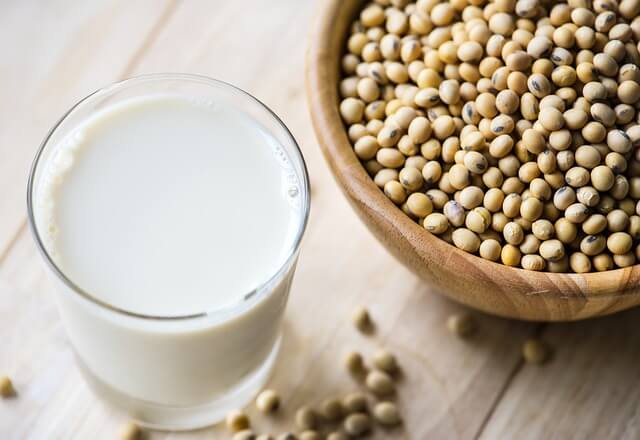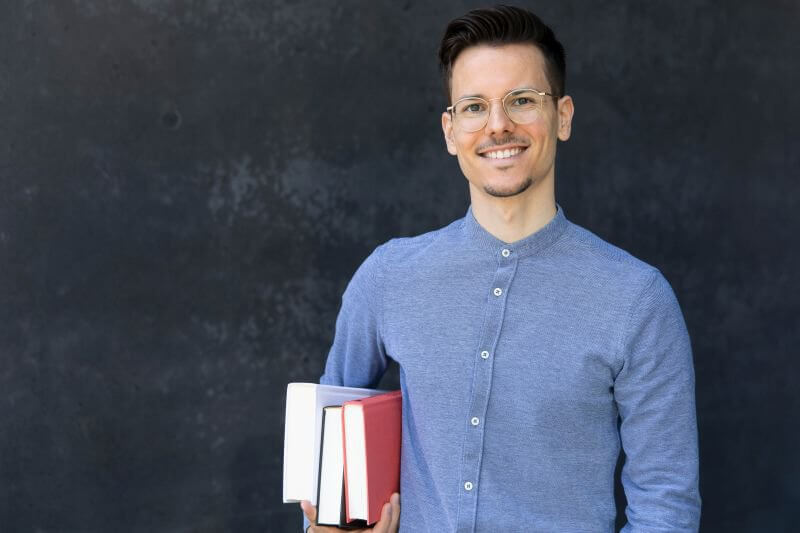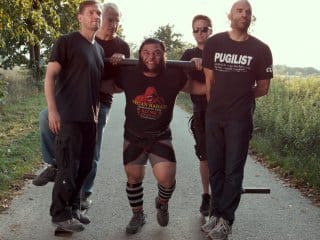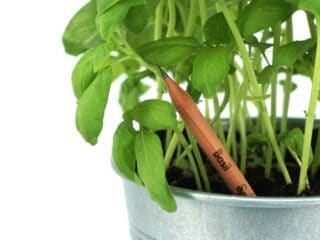Goodbye vegan cliché: Niko Rittenau interviewed about nutrition myths
- Posted on
- 8 minute read
- Yannick

Niko Rittenau studied nutritional counseling and is currently in the master’s program in micronutrient therapy and regulatory medicine.
He combines his skills as a trained chef with the nutritional knowledge of his academic career to create innovations where good taste meets health consciousness and sustainable consumption.
As a university lecturer, seminar leader, speaker and walking encyclopedia, he conveys the topic of nutrition with great enthusiasm, packaging expert knowledge in an evidence-based, yet lively and practical way. In September 2018, he published his first book “Vegan-Klischee ade!” (Goodbye toveganclichés!), in which he takes a scientifically sound look at the most common clichés about vegan nutrition on more than 450 pages.
In the interview with “This Is Vegan” he tells, with which vegan nourishing myths he would like to clear up, which food should stand daily on our menu and whether he falls back despite his knowledge also now and then to fast food.
How did you come to eat a vegan diet?
Niko Rittenau: I originally come from the hotel industry and used to want to be the manager of a luxury hotel on a Caribbean island. However, when I came into contact with the vegan movement as part of my first bachelor’s degree in business management, it made me rethink my own actions and plans for the future, and from then on I wanted to work for something meaningful. In the course of this, I also changed my diet to vegan in 2013.

Why is a plant-based diet so important?
Niko Rittenau: A plant-based diet is a multi-problem solver and, along with other measures in our society, can sometimes be an answer to the crisis in our health care system, the food shortages to feed the growing world population, the destruction of our environment, and the ethical conflicts associated with our diet.
How does a Niko Rittenau start a perfect day?
Niko Rittenau: On five out of seven days, I start with a workout right after I get up, followed by our super nutritious power protein smoothie, for which we have also published a detailed recipe video on my YouTube channel.
What foods should be on the menu every day to stay healthy for as long as possible?
Niko Rittenau: Any diet should be based on the five main food groups of whole grains, legumes, vegetables, fruits, and nuts/seeds.
Each of these food groups has its own beneficial ingredients, which is why you should choose from all five groups. Of course, not every food from each group is the same. Among legumes, soy products stand out in terms of health; among vegetables, cruciferous vegetables and dark green leafy vegetables; among fruits, berries; and among nuts and seeds, walnuts and flaxseeds. In addition, mushrooms such as champignons should be eaten several times a week, as they also contain special substances that can act as natural aromatase inhibitors to prevent cancer.
In your book "Vegan-Klischee ade!" you refute the most common vegan clichés. Which cliché gets on your nerves the most?
Niko Rittenau: To be honest, none of the clichés annoy me, because I can well understand that many people are confused by the contradictory dissemination of information on nutritional topics and believe in misconceptions that have long since been disproved.
Therefore, I have no problem in 2019 to explain to people again and again that you can cover all essential nutrients purely vegan, that tofu does not destroy the rainforest, children can also live vegan and much more.
"I have no problem explaining to people over and over again that you can cover all the essential nutrients purely vegan, that tofu doesn't destroy the rainforest, and that children can live vegan too!"
Niko Rittenau Tweet
What was your impetus for writing a book?
Niko Rittenau: On the one hand, there was no book in Germany that so explicitly addressed all the questions and myths regarding vegan nutrition, and on the other hand, I was asked the same things over and over again after my lectures, courses or even online. As much as I would like to answer each person individually, this does not work out due to lack of time and therefore I write books or make videos on the most common questions in order to be able to answer as many people’s questions as possible.

As a trained chef and nutritionist, what tip do you have for anyone who thinks it's too time-consuming to eat a healthy, vegan diet?
"My hope is that in the future, food manufacturers will also focus more on healthy, plant-based convenience products!"
Niko Rittenau Tweet

In your book, you devote an entire chapter to the topic of soy. What is it all about?
Niko Rittenau: The topic of soy has been with me for a long time, because from the beginning people have always asked me about the alleged estrogen-like effect of soy products.
However, since I didn’t learn anything about this topic in my bachelor’s degree program in nutrition counseling, I decided to dedicate my bachelor’s thesis to this topic. This bachelor’s thesis formed the basis for the soy chapter in my book, which of course was expanded with a lot more information during the writing process. I am not paid by the soy lobby or anyone else to speak well about soy, but merely reflect the scientific data and the opinions of international professional societies. In fact, with the exception of soy allergy sufferers, all people can consume soy products at all stages of life without any problems.
What tips do you have for anyone new to starting a vegan diet?
Niko Rittenau: There are very good introductory programs for people interested in veganism, such as the Albert Schweitzer Foundation’s “VeganTaste Week” or “Veganstart” by Peta. These and other free activities make it much easier to get started, as they provide a wealth of important basic information in an easy-to-understand format.
What is the most beautiful change in terms of "vegan nutrition" that you have been able to observe so far?
Niko Rittenau: On the health level, often seen successes with a whole-food vegan diet are a reduction in blood pressure, an improvement in cholesterol and triglyceride levels, better insulin sensitivity in diabetics, weight reductions despite sufficient feeling of satiety, etc.
On an emotional level, of course, it touches me anew every time I take part in an Animal Rights March, for example, as I did recently in Berlin, and experience how many thousands of people gather for a common cause, to give animals a voice.
"Often seen successes with a whole-food vegan diet include a reduction in blood pressure, improvement in cholesterol and triglyceride levels, better insulin sensitivity in diabetics, and weight reductions despite feeling full enough!"
Niko Rittenau Tweet
Cross your heart! Despite your vast knowledge of healthy eating, do you eat sweets and fast food from time to time?
Niko Rittenau: Absolutely! If there’s one important thing I’ve learned from the nutritional data, it’s that there are no “healthy” and “unhealthy” foods, only healthy and unhealthy diets. Basically, you don’t have to forbid yourself anything from a health perspective, but rather focus on an overall healthy diet. I eat a mostly whole-food diet, but I consciously enjoy a small piece of chocolate every day, and I like to have a dessert in a restaurant.

What other exciting projects can we expect from you in 2019/2020?
Niko Rittenau: A whole lot! In February 2020, as I said, the “Vegan-Klischee ade!” cookbook will be published by Dorling Kindersley in collaboration with Sebastian Copien, in which I will create healthy and tasty vegan dishes together with Sebastian, building on the nutritional foundations of my first book. In addition, there is also quite a bit of nutritional knowledge in this book on the topics of merchandise knowledge and implementing nutritional strategies into everyday life. We are also currently shooting a documentary on Clean Meat for YouTube, which will also be released in the first quarter of 2020. The third highlight for me is the new music project I started with the musicians Flaex and Flo Hillen. In the context of this project we make common music with vegan contents and go with it in the coming year also on tour. You can already watch the music video for our first joint song “Blauer Planet” on my YouTube channel.
Anything you'd like to get off your chest in closing?
Niko Rittenau: We can all be part of the change that our world so urgently needs. Therefore, let’s eat as if the future of our planet depends on it – because it does.
Photos:
Tatyana Kronbichler
Claudia Weingart
Pixabay / Rawpixel
Nächster Artikel
Niko Rittenau about myths around vegan nutrition
- Posted on
- Yannick
Empathy in the belly – Oli P. on vegan nutrition, animal welfare and sustainability
- Posted on
- Yannick
Vegan nutrition against the Corona virus – Dr. med. Petra Bracht in the interview
- Posted on
- Yannick
Veganuary! CEO Ria Rehberg about new records at vegan month 2023
- Posted on
- Yannick
Vegan is unhealthy?! Gordon Prox on the future, his start-up and family
- Posted on
- Yannick
Vegan athletes: Top 10 athletes & their plant-based diet
- Posted on
- Daniel Köhler
Pens to plant! – Interview with Sprout World founder Michael Stausholm
- Posted on
- Yannick
The Hype Around Oat Milk – The Oatly Germany CEOs in Interview
- Posted on
- Yannick









